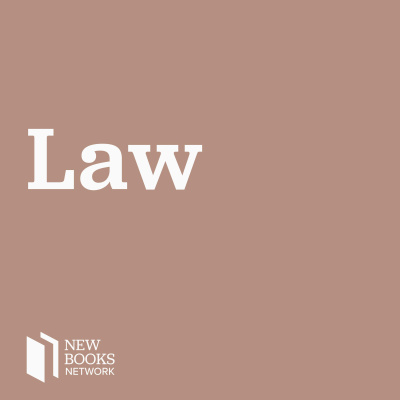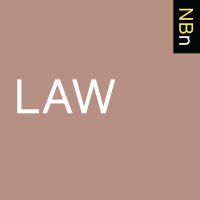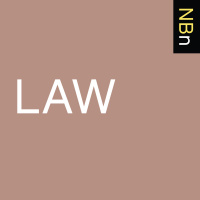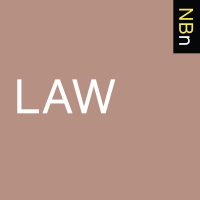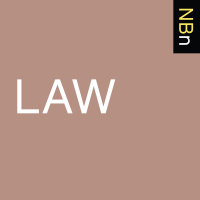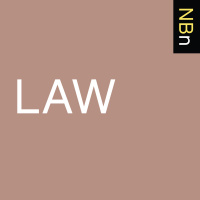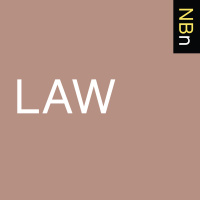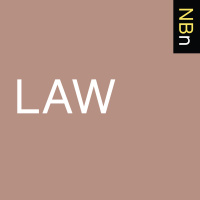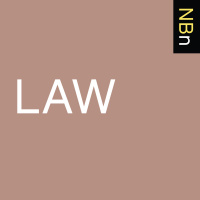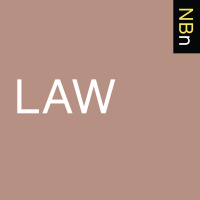Sinopsis
Interviews with Scholars of the Law about their New Books
Episodios
-
Adam Malka, "The Men of Mobtown: Policing Baltimore in the Age of Slavery and Emancipation" (UNC Press, 2018)
04/12/2018 Duración: 01h01minCriminal justice, policing, and mass incarceration have gained significant political attention recently, and the problems of these systems have drawn increasingly frequent calls for reform from the right and left. Historians have turned their attention to illuminating the roots of these institutions. While many historians have focused on the 20th century, others have examined the emergence of urban professional police departments in the 19th century. Adam Malka, an Assistant Professor of History at the University of Oklahoma, takes these questions to the antebellum period to illuminate how these new police forces emerged in an age of liberal ideals and emancipation. In The Men of Mobtown: Policing Baltimore in the Age of Slavery and Emancipation (University of North Carolina Press, 2018), Malka examines the development of the Baltimore police department in the years leading up to and following the Civil War. Malka highlights several unexpected features of this development. He shows the continuity and connecti
-
Jennifer Altehenger, "Popularizing Laws in the People’s Republic of China, 1949-1989" (Harvard U Asia Center, 2018)
04/12/2018 Duración: 01h02minIn her new book, historian Jennifer Altehenger, a Senior Lecturer in Contemporary Chinese History at King’s College London, grapples with the complex issue of how authorities and cultural workers attempted to create effective law propaganda. Legal Lessons: Popularizing Laws in the People’s Republic of China, 1949-1989 (Harvard University Asia Center, 2018) traces the techniques used and challenges using a series of case studies including the 1953 Marriage Law mass campaign and the 1954 constitution national discussion. These efforts sought not only to inform Chinese citizens of the law but also involved them in such ways that they would feel obliged to then follow the laws in the future. Drawing from a wide variety of archival sources including government documents, periodicals, advice manuals, memoirs, and posters, Altehenger highlights the tension between the intention of the government to educate and the interpretations the people made themselves about new laws. She explores law dissemination into th
-
Shobita Parthasarathy, “Patent Politics: Life Forms, Markets, and the Public Interest in the United States and Europe” (U Chicago Press, 2017)
21/11/2018 Duración: 01h50sIn Patent Politics: Life Forms, Markets, and the Public Interest in the United States and Europe (University of Chicago Press, 2017), Shobita Parthasarathy takes us through a thirty year history of the legal debates around patents. This is an understudied area of STS that Parthasarathy carefully navigates in order to understand how knowledge production interacts with law. The reader learns the differences in values, law and objects between US and European patent politics. This comparison brings into focus the role that law, biotechnology corporations, scientists, activists, and more play in deciding what knowledge deserves legal protection. Patent Politics is a fascinating read that will continue to be relevant for many years to come. Chad J. Valasek is a Ph.D. Candidate in Sociology & Science Studies at the University of California, San Diego. His research interests include the history of the human sciences, the influence of the behavioral sciences on medical practice and health policy, and political ac
-
Yael Ben-zvi, “Native Land Talk: Indigenous and Arrivant Rights Theories” (Dartmouth College Press, 2018)
15/11/2018 Duración: 01h18minHistories of rights have too often marginalized Native Americans and African Americans. Addressing this lacuna, Native Land Talk: Indigenous and Arrivant Rights Theories (Dartmouth College Press, 2018), expands our understanding of freedom by examining rights theories that Indigenous and African-descended peoples articulated in the eighteenth and nineteenth centuries. As settlers began to distrust the entitlements that the English used to justify their rule, the colonized and the enslaved formulated coherent logics of freedom and belonging. By anchoring rights in nativity, they countered settlers’ attempts to dispossess and disenfranchise them. Drawing on a plethora of texts, including petitions, letters, newspapers, and official records, Yael Ben-zvi, American Studies Professor at Ben-Gurion University of the Negev, analyzes nativity’s unsettling potentials and its discursive and geopolitical implications. She shows how rights were constructed in relation to American, African, and English spaces, and explain
-
Mike Ananny, “Networked Press Freedom: Creating Infrastructures For a Public Right to Hear” (MIT Press, 2018)
05/11/2018 Duración: 43minIn Networked Press Freedom: Creating Infrastructures For a Public Right to Hear (MIT Press, 2018), journalism professor Mike Ananny provides a new framework for thinking about the media at a time of significant change within the industry. Drawing on a variety of disciplines from journalism studies, political theory and technological studies, Ananny argues press freedom is a result of an interplay of duty, autonomy, social, and institutional forces. Focusing on the public right to hear, Ananny explores the competing values and publics journalists must negotiate to provide objective news and to build trust. Exploring the complexities of ‘doing journalism’ in the 21st century with competing technological platforms he attempts to answer the question: what is the role of journalism and freedom of the press in the modern era? Learn more about your ad choices. Visit megaphone.fm/adchoices
-
J. Obert, A. Poe, A. Sarat, eds., “The Lives of Guns” (Oxford UP, 2018)
01/11/2018 Duración: 32minWhat if guns “are not merely carriers of action, but also actors themselves?” That’s the question that animates and unites Jonathan Obert‘s and Andrew Poe‘s, and Austin Sarat‘s unique collection of essays, The Lives of Guns (Oxford University Press, 2018). In it, contributors discuss the political, social and personal “lives” of guns from a variety of perspectives. Join us to hear editors Obert and Poe help us consider new ways of thinking about American narratives of ballistic weapons. Stephen Pimpare is Senior Lecturer in the Politics & Society Program and Faculty Fellow at the Carsey School of Public Policy at the University of New Hampshire. He is the author of The New Victorians(New Press, 2004), A People’s History of Poverty in America (New Press, 2008), winner of the Michael Harrington Award, and Ghettos, Tramps and Welfare Queens: Down and Out on the Silver Screen (Oxford University Press, 2017).Learn more about your ad choices. Visit megaphone.fm/adchoices
-
Nathan K. Finney and Tyrell O. Mayfield, “Redefining the Modern Military: The Intersection of Profession and Ethics” (Naval Institute Press, 2018)
31/10/2018 Duración: 52minRedefining the Modern Military: The Intersection of Profession and Ethics (Naval Institute Press, 2018), edited by Nathan K. Finney and Tyrell O. Mayfield, is a collection of essays examining military professionalism and ethics in light of major changes to modern warfare. Contributors examine philosophical and legal questions about what constitutes a profession, the requirements of a military professional, and military education. Additionally, the authors tackle questions of ethics related to new technological advancements, such as unmanned aircraft. Finally, an interesting discussion of the military’s relationship with society, and vice versa, is discussed as an important component of oversight of the profession. Today I spoke with Finney and one of the contributors, Brian Laslie. Beth Windisch is a national security practitioner. You can tweet her @bethwindisch.Learn more about your ad choices. Visit megaphone.fm/adchoices
-
Jeffrey D. Sachs, “A New Foreign Policy: Beyond American Exceptionalism” (Columbia UP, 2018)
10/10/2018 Duración: 57minIf you are tired of reading the same, Washington-based, consensus, ‘realist’ and or ‘neo-conservative’, critiques of American foreign policy, here is something to salivate on: Jeffrey D. Sachs’, A New Foreign Policy: Beyond American Exceptionalism (Columbia University Press, 2018). By turns, noted author Jeffrey Sachs’ book is unorthodox, iconoclastic, novel and indeed at times eccentric. A New Foreign Policy provides a road map for a U.S. foreign policy that embraces globalism, cooperation, international law, and aspirations for worldwide prosperity—not nationalism and illusory dreams of empty and past glory. You may not agree with him, indeed you may believe that he is completely wrong and his facts do not add up. Regardless, Sachs’ book is the one that foreign policy experts will be discussing this Fall. Charles Coutinho holds a doctorate in history from New York University. Where he studied with Tony Judt, Stewart Stehlin and McGeorge Bundy. His Ph. D. dis
-
Deborah Jaramillo, “The Television Code: Regulating the Screen to Safeguard the Industry” (U Texas Press, 2018)
09/10/2018 Duración: 50minIf you watch old movies or study film history, you may know that early 20th-century Hollywood operated under the Motion Picture Production Code, which dictated what could and couldn’t be portrayed onscreen. But did you know that television had a code of its own? Its story has never been told at length until now. Deborah Jaramillo, Associate Professor of Film and Television at Boston University, is the author of a new book called The Television Code: Regulating the Screen to Safeguard the Industry (University of Texas Press, 2018). Jaramillo tells the story of a young television industry’s attempt to police itself on controversial questions about content, fending off pressure from government regulators and finicky viewers. Jaramillo explores whether the federal government could have played a stronger role at this formative time in the industry, and what the code did and didn’t accomplish in its three decades of existence.Learn more about your ad choices. Visit megaphone.fm/adchoices
-
K. Dittmar, K. Sanbonmatsu, and S. Carroll, “A Seat at the Table: Congresswomen’s Perspectives on Why Their Presence Matters” (Oxford UP, 2018)
08/10/2018 Duración: 22minInterviewing one member of Congress is a feat for most researchers. Interviewing nearly 100 and almost every women member of Congress is remarkable. Even more remarkable is what we can learn from that data collection about the perceptions of women members of Congress, especially about the way they perceive recent partisan polarization and the changing role of gender, race, and ethnicity. Such is the exhaustive project of Kelly Dittmar, Kira Sanbonmatsu, and Susan J. Carroll, who are the authors of A Seat at the Table: Congresswomen’s Perspectives on Why Their Presence Matters (Oxford University Press, 2018). Dittmar is assistant professor of political science, Sanbonmatsu is professor of political science, and Carroll is professor of political science and gender studies, all at Rutgers University. If you want to know how members of Congress think and the ways that they view their work, you would be hard pressed to find a better book. Dittmar, Sanbonmatsu, and Carroll fill so many blanks in the study of the wa
-
Daniel E. Ponder, “Presidential Leverage: Presidents, Approval, and the American State” (Stanford UP, 2018)
04/10/2018 Duración: 49minDan Ponder’s new book, Presidential Leverage: Presidents, Approval, and the American State (Stanford University Press, 2018), is an important and thoughtful exploration of the concept of presidential leverage, specifically how much capacity the president has to accomplish goals, particularly in terms of asserting power to produce outcomes from Congress. Ponder examines leverage in context, which makes this book very useful in thinking about not only the Executive, but also the Legislature, and the ways in which the branches and political bodies operate in our political system. Presidential Leverage explores not only the president’s role in many of the ways scholars generally assess the president, but also the presidency as part of the state itself. Ponder braids together this understanding of position of the president (and his/her general approval or disapproval by the citizens) and how the strength of that position is tied not just to the office and the person in it, but also to broader conceptualizations of
-
Candice Delmas, “A Duty to Resist: When Disobedience Should Be Uncivil” (Oxford UP, 2018)
01/10/2018 Duración: 01h06minAccording to a long tradition in political philosophy, there are certain conditions under which citizens may rightly disobey a law enacted by a legitimate political authority. That is, it is common for political philosophers to recognize the permissibility of civil disobedience, even under broadly just political conditions. There are, of course, longstanding debates over how to distinguish civil from uncivil disobedience, what forms civil disobedience may take, and the difference between civil disobedience and other kinds of principled lawbreaking (such as conscientious refusal). Yet the consensus seems to be that whenever disobedience is permissible, it must also be enacted within the constraints of civility. In her new book, A Duty to Resist: When Disobedience Should Be Uncivil (Oxford University Press, 2018), Candice Delmas challenges this consensus. She develops an argument according to which standard arguments for the general obligation to obey the law also permit forms of principled lawbreaking that
-
B. P. Owensby and R. J. Ross, “Justice in a New World: Negotiating Legal Intelligibility in British, Iberian, and Indigenous America” (NYU Press, 2018)
28/09/2018 Duración: 01h17minJustice in a New World: Negotiating Legal Intelligibility in British, Iberian, and Indigenous America (New York University Press, 2018), edited by Brian P. Owensby and Richard J. Ross, examines the conflict and interplay between settler and indigenous laws in the New World. As British and Iberian empires expanded across the New World, differing notions of justice and legality played out against one another as settlers and indigenous people sought to negotiate their relationship. In order for settlers and natives to learn from, maneuver, resist, or accommodate each other, they had to grasp something of each other’s legal ideas and conceptions of justice. This ambitious volume advances our understanding of how natives and settlers in both the British and Iberian New World empires struggled to use the other’s ideas of law and justice as a political, strategic, and moral resource. In so doing, indigenous people and settlers alike changed their own practices of law and dialogue about justice. Europeans and
-
Mary Fulbrook, “Reckonings: Legacies of Nazi Persecution and the Quest for Justice” (Oxford UP, 2018)
27/09/2018 Duración: 57minWhat voices have been silenced in the history of the Holocaust? How did victims and perpetrators make sense of their experiences? How did the failed pursuit of post-war justice shape public memory? In her new book Reckonings: Legacies of Nazi Persecution and the Quest for Justice (Oxford University Press, 2018), Mary Fulbrook uses diaries, memoirs, and trials to recover the full spectrum of suffering and guilt. By exposing the disconnect between official myths and unspoken realities of post-war justice, Mary illuminates the changing public attitudes to perpetrators and survivors. Mary Fulbrook is a Professor of German History at University College London. Her numerous books cover modern Germany, its two dictatorships, the Holocaust, and questions of historical interpretation. She currently directs the AHRC Compromised Identities project on the character and personal legacies of perpetration and complicity. Fulbrook is also a member of the Academic Advisory Board of the former concentration camps Buchenwald an
-
Svetlana Stephenson, “Gangs of Russia: From the Streets to the Corridors of Power” (Cornell University Press, 2015)
26/09/2018 Duración: 35minThe title of Svetlana Stephenson’s book Gangs of Russia: From the Streets to the Corridors of Power (Cornell UP, 2015) invites a number of questions: How do criminal and legal spheres conflate? Is the cooperation of criminal organizations and legal institutions inherent to a society structure? In what way do gangs shape society, and vice versa? And what model of the societal structure does the Russian case offer? Far from being exhaustive, these issues receive a thorough investigation in Svetlana Stephenson’s attempt to analyze Russian gangs from the perspective of a social form. As the scholar asserts, “Russian gangs are not alien to society: they are firmly embedded in it” (9). Gangs do not constitute separate worlds, although they may seem closed and isolated: gangs signal individual’s aspirations and ambitions and, to a large extent, societal challenges. Gangs of Russia traces the development of Russian criminal organizations, ranging from early Soviet years to the present-day Russia. Including data and i
-
Sarah E. Holcombe, “Remote Freedoms: Politics, Personhood and Human Rights in Aboriginal Central Australia” (Stanford UP, 2018)
26/09/2018 Duración: 16minIn her new book, Remote Freedoms: Politics, Personhood and Human Rights in Aboriginal Central Australia (Stanford University Press, 2018), Sarah E. Holcombe, a Senior Research Fellow at the University of Queensland and a Visiting Fellow at the Australian National University, explores how universal human rights, codified 70 years ago in the Universal Declaration of Human Rights, get translated, practiced, and challenged in the context of Indigenous rights. Through her field research with Anangu of Central Australia, she shows the paradoxical, double-edged nature of human rights for Aboriginal people and considers alternative ways of thinking about human dignity.Learn more about your ad choices. Visit megaphone.fm/adchoices
-
Ken Ilguas, “This Land is Our Land: How We Lost the Right to Roam and How to Take It Back” (Plume, 2018)
25/09/2018 Duración: 49minAuthor, journalist and sometime park ranger Ken Ilgunas has written an argument in favor a “right to roam.” This concept, unfamiliar to most Americans, is one of an ability to traverse public and private property for purposes of enjoying nature. In This Land is Our Land: How We Lost the Right to Roam and How to Take It Back (Plume, 2018), Ilgunas compares U.S. property laws with the traditions and laws of England, Scotland and Scandinavian countries. In these nations a right to roam has been recognized and, Ilgunas argues, has been a boon to citizens’ enjoyment of their nations’ lands, while also protecting the property rights of private owners. Ilgunas addresses owners’ concerns about the use and enjoyment of their land and makes the case that a “right to roam” would be beneficial to owners and members of the public alike. Yet, Ilgunas also acknowledges the obstacles to creating such a right in the United States: popular understandings of the sacredness of private property, fears of lawsuits, the existe
-
Jonathan W. White, “Lincoln on Law, Leadership, and Life” (Cumberland House, 2015)
13/09/2018 Duración: 36minJonathan W. White, an associate professor of American Studies at Christopher Newport University, is the author of Lincoln on Law, Leadership, and Life (Cumberland House, 2015). In this work White reveals the moral character of Abraham Lincoln through his law practice. Lincoln was a lawyer on the American frontier in Illinois, representing clients ranging from individuals in divorces and railroads in contract disputes. Throughout his career he rendered advice, not only to clients but to prospective young lawyers and friends. Lincoln’s experience as a lawyer is both revealing about the norms of law practice in the antebellum period and about the formation of Lincoln’s approach to law and governance, which would influence his behavior as President during the Civil War. White has an eye for entertaining and revealing anecdotes. In revealing how Lincoln practiced law White helps uncover Lincoln as a person, beyond the reverential historical figure we all know from America’s Civil War. Ian J. Drake is an Asso
-
Lev Weitz, “Between Christ and Caliph: Law, Marriage, and Christian Community in Early Islam” (U Pennsylvania Press, 2018)
04/09/2018 Duración: 01h04minRecent years have seen new waves of research in Syriac studies, the medieval Middle East, and family history. Combining all three, Lev Weitz’s Between Christ and Caliph: Law, Marriage, and Christian Community in Early Islam (University of Pennsylvania Press, 2018), revisits the early years of Islamic civilization by looking at an oft-neglected population in the secondary literature, Syriac Christians. Weitz’s study uses marital practice from the seventh through tenth centuries to illustrate how Islamic law influenced the development of Christian law and the role religious authorities –that is the Christian bishops– had to play in it. We talk through polygamy, confessional boundaries, and what households meant now and then; Weitz also fills us in on what the growing field of Syriac studies looks like, how it is changing, and how a scholar of the medieval Middle East gets their sources. Lev Weitz is an historian of the Islamic Middle East. He is an assistant professor at the Catholic University of America, in t
-
Samuel Moyn, “Not Enough: Human Rights in an Unequal World” (Harvard UP, 2018)
04/09/2018 Duración: 55minSamuel Moyn’s The Last Utopia traced the evolution of the human rights revolution and argued that human rights as an ideology took the place of socialism and other utopian ideologies that failed. In his new book, Not Enough: Human Rights in an Unequal World (Harvard University Press, 2018), Moyn examines human rights from a different perspective, namely its inability to challenge the rise of inequality across the world. Moyn argues that this development wasn’t inevitable from a historical perspective and was the result of decisions made by politicians and social priorities articulated by philosophers beginning in the twentieth century. As a consequence, human rights has coexisted alongside inequality, unable to meaningfully critique it. Moyn begins by looking at the French Revolution, which he asserts was the first government that explicitly thought in egalitarian terms for its citizens. Noting that the welfare state was ironically a project of right-wing nationalist governments, Moyn argues that the postwar
